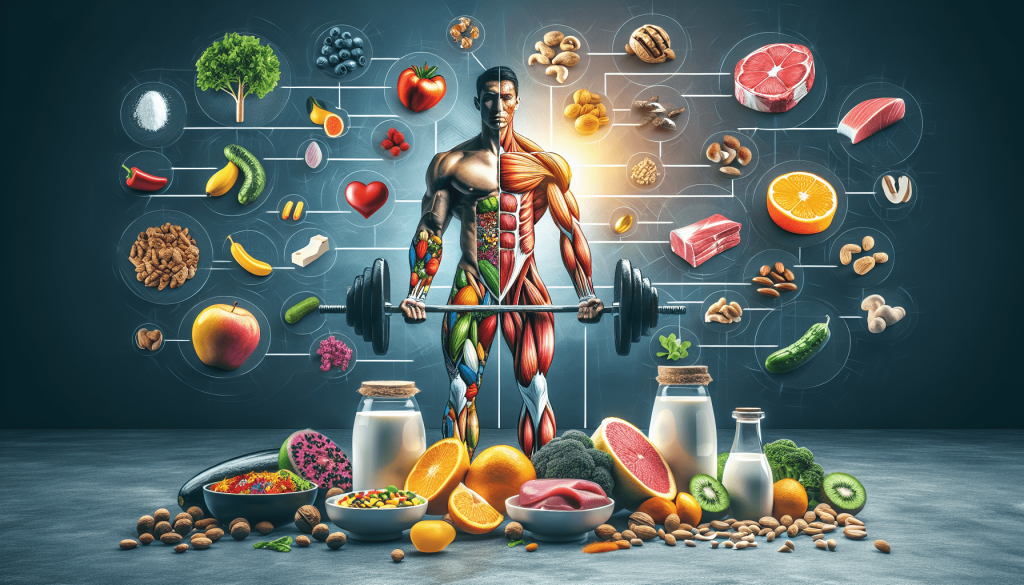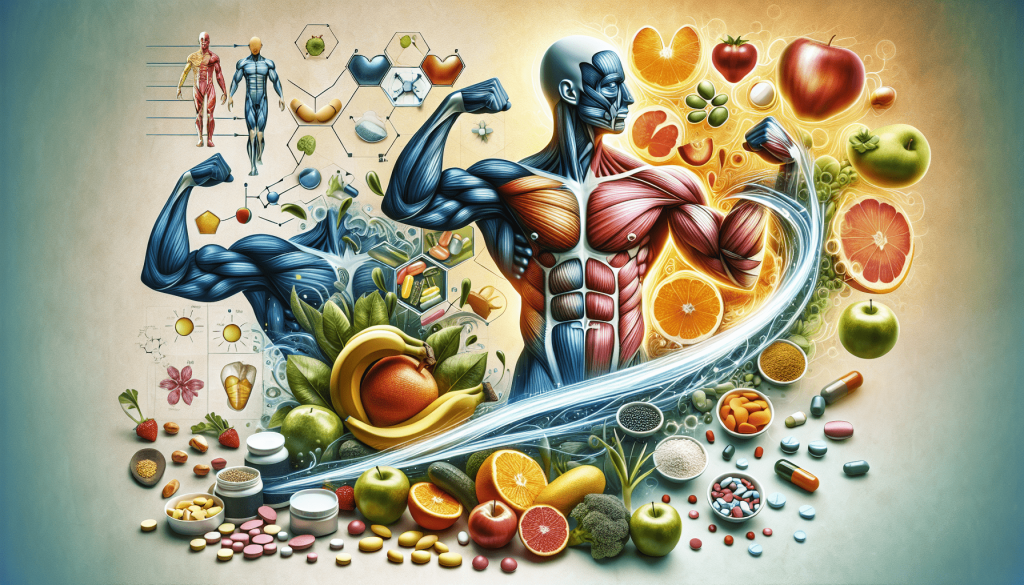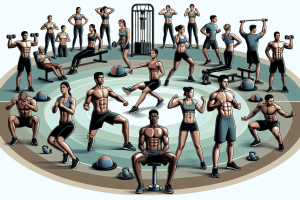When it comes to building muscles and achieving that enviable six-pack, it’s not just about hitting the gym and lifting weights – proper nutrition plays a crucial role too. One of the key aspects of a well-rounded muscle-building diet is ensuring that you’re getting enough vitamins and minerals. But how can you make sure you’re meeting the necessary requirements for muscle growth? In this article, we’ll explore some effective strategies to help you ensure you’re getting the right nutrients to fuel your muscles and support their growth. So if you’re ready to take your fitness journey to the next level, keep reading to discover how to optimize your vitamin and mineral intake for maximum muscle gains.

Eat a Balanced Diet
Maintaining a balanced diet is essential for overall health and well-being. By including a variety of fruits and vegetables, choosing lean sources of protein, incorporating whole grains, and including healthy fats in your diet, you can ensure that your body receives the necessary nutrients it needs to function at its best.
Include a Variety of Fruits and Vegetables
Fruits and vegetables are packed with vitamins, minerals, and antioxidants that are vital for muscle growth and overall health. Aim to include a variety of colorful fruits and vegetables in your meals and snacks to ensure you’re getting a wide range of nutrients. From berries and leafy greens to bell peppers and carrots, the options are endless. Experiment with different flavors and textures to keep your meals exciting and nutritious.
Choose Lean Sources of Protein
Protein is crucial for muscle growth and repair. Ensure that you’re consuming sufficient protein by calculating your protein needs based on your body weight and activity level. Incorporate protein-rich foods such as chicken, turkey, fish, tofu, eggs, and legumes into your meals and snacks. Remember to include a variety of protein sources to get a complete range of essential amino acids.
Incorporate Whole Grains
Whole grains, such as brown rice, quinoa, oats, and whole wheat bread, provide a valuable source of energy and essential nutrients. They are rich in fiber, vitamins, and minerals that support optimal muscle growth and digestion. Replace refined grains with whole grains whenever possible to reap the maximum benefits.
Include Healthy Fats
Contrary to popular belief, fats are an essential part of a balanced diet. Healthy fats, such as those found in avocados, nuts, seeds, and olive oil, provide a concentrated source of energy and assist in the absorption of fat-soluble vitamins. Incorporate these fats into your diet in moderation to support overall health and maintain a balanced macronutrient intake.
Consume Sufficient Protein
Protein is a key building block for muscle growth, repair, and maintenance. It’s crucial to ensure that you’re consuming enough protein to support your muscle-building goals.
Calculate Your Protein Needs
To determine your protein needs, consider factors such as your body weight, activity level, and muscle-building goals. As a general guideline, aim to consume around 0.8 to 1 gram of protein per pound of body weight. However, individual protein requirements may vary, so it’s essential to consult with a healthcare professional or registered dietitian to determine the optimal protein intake for your specific needs.
Include Protein-Rich Foods in Meals and Snacks
Incorporating protein-rich foods into your meals and snacks is vital for meeting your protein requirements. Opt for lean sources of protein such as chicken, turkey, fish, tofu, Greek yogurt, cottage cheese, and beans. Make sure to distribute your protein intake evenly throughout the day to support muscle recovery and growth. Including protein in your snacks, such as having a handful of almonds or a protein shake, can be a convenient way to meet your protein needs.
Focus on Micronutrients
While macronutrients like protein, carbohydrates, and fats are important, it’s equally crucial to pay attention to micronutrients – the vitamins and minerals that your body needs in smaller quantities.
Get Sufficient Vitamin D
Vitamin D plays a crucial role in muscle function and overall health. It assists in calcium absorption, which is essential for bone health and muscle contractions. Vitamin D can be synthesized by the body when exposed to sunlight, but it can also be obtained through dietary sources such as fatty fish, fortified dairy products, and egg yolks. If you’re concerned about your vitamin D levels, it may be beneficial to have a blood test done to determine if you need supplementation.
Ensure an Adequate Intake of Calcium
Calcium is essential for maintaining strong bones and muscles. Besides dairy products such as milk, yogurt, and cheese, other sources of calcium include leafy greens like kale and spinach, tofu, almonds, and fortified plant-based milk alternatives. Aim to incorporate calcium-rich foods into your diet to support muscle growth and overall bone health.
Include Iron-Rich Foods
Iron is necessary for transporting oxygen to your muscles, and a deficiency can lead to decreased athletic performance and fatigue. Include iron-rich foods such as lean red meat, poultry, fish, fortified cereals, legumes, and leafy green vegetables in your diet. Pairing iron-rich foods with vitamin C-rich foods, such as citrus fruits or bell peppers, can enhance iron absorption.
Meet Magnesium Requirements
Magnesium is involved in over 300 biochemical reactions in the body, including protein synthesis and muscle function. Good sources of magnesium include nuts, seeds, whole grains, leafy green vegetables, and legumes. Aim to meet your magnesium requirements through dietary sources, but supplementation may be necessary if advised by a healthcare professional.
Include Zinc-Rich Foods
Zinc is essential for proper immune function and protein synthesis, which is vital for muscle growth and repair. Foods high in zinc include lean meats, seafood, whole grains, nuts, and seeds. Ensuring an adequate intake of zinc through your diet or, if necessary, through supplementation can support your muscle-building goals.
Consider Vitamin and Mineral Supplements
While a balanced diet should be the primary source of your vitamin and mineral intake, certain circumstances may warrant the use of supplements. It’s essential to approach supplementation cautiously and seek guidance from a healthcare professional to ensure you’re making informed choices.
Consult with a Healthcare Professional
Before starting any vitamin or mineral supplement regimen, it’s important to consult with a healthcare professional or registered dietitian. They can assess your specific needs based on factors such as your overall health, diet, and fitness goals. They can also guide you on appropriate supplement choices and dosages.
Choose Supplements Wisely
Not all supplements are created equal, and it’s important to choose quality products from reputable brands. Look for third-party testing certifications, such as NSF or USP, to ensure that the supplements meet the highest standards of quality and purity. Opt for supplements that provide the specific vitamins and minerals you may be lacking or have difficulty obtaining through your diet.
Avoid Excess Supplementation
While it may be tempting to supplement with high doses of certain vitamins or minerals, it’s important to avoid excessive supplementation. Taking excessive amounts of certain nutrients can have adverse effects on your health and may interfere with the absorption of other vital nutrients. Stick to recommended dosages and consult with a healthcare professional to prevent any potential complications.

Stay Hydrated
Proper hydration is often overlooked but is crucial for maintaining good overall health and supporting muscle growth. Inadequate hydration can lead to decreased performance, muscle cramps, and impaired recovery.
Drink Sufficient Water
Drinking enough water throughout the day is essential for staying hydrated. The exact amount of water needed varies depending on factors such as body weight, activity level, and climate. As a general guideline, aim to drink at least eight glasses (64 ounces) of water per day or more if you’re physically active or in a hot environment. Carry a reusable water bottle with you to ensure you have access to water wherever you go.
Consider Electrolyte Replenishment for Intense Training
During intense training sessions or prolonged periods of physical activity, electrolytes can be lost through sweat. Electrolytes, such as sodium, potassium, and magnesium, help maintain fluid balance and support proper muscle function. Consider replenishing electrolyte levels by consuming sports drinks, coconut water, or electrolyte tablets during and after intense workouts.
Get Enough Sleep
Getting enough quality sleep is crucial for muscle growth, recovery, and overall well-being. Lack of sleep can hinder your progress and negatively impact your performance.
Emphasize Quality Sleep
Not only is the duration of sleep important, but the quality of sleep matters too. Aim for seven to nine hours of uninterrupted sleep each night to give your body enough time to recover and rejuvenate. Create a sleep-friendly environment by ensuring your bedroom is dark, quiet, and cool, and establish a consistent sleep routine that allows you to wind down before bed.
Allow for Sufficient Rest and Recovery
In addition to getting enough nightly sleep, it’s important to allow your body to rest and recover between workouts. This may include incorporating active recovery days, scheduling rest days, or engaging in activities such as yoga or gentle stretching that promote relaxation and muscle recovery. Listen to your body and allow for adequate rest to optimize your muscle-building progress.

Ensure Proper Digestion and Absorption
Even if you’re consuming a balanced diet, it’s important to ensure that your body is digesting and absorbing the nutrients effectively. Poor digestion and absorption can hinder your body’s ability to utilize the vitamins and minerals necessary for muscle growth.
Promote Gut Health
A healthy gut is essential for proper digestion and nutrient absorption. Incorporate foods rich in fiber, such as fruits, vegetables, whole grains, and legumes, to support a healthy gut microbiome. Probiotic-rich foods, such as yogurt and fermented vegetables, can also promote beneficial gut bacteria. Additionally, minimize processed foods, refined sugars, and excessive alcohol consumption, as they can negatively impact gut health.
Optimize Digestive Enzymes
Certain individuals may benefit from taking digestive enzyme supplements to enhance the breakdown and absorption of nutrients. These supplements contain enzymes, such as amylase, protease, and lipase, that aid in the digestion of carbohydrates, proteins, and fats, respectively. Consult with a healthcare professional to determine if digestive enzyme supplementation is appropriate for you.
Manage Stress Levels
High levels of stress can negatively affect digestion and nutrient absorption. Incorporate stress-management techniques into your daily routine, such as mindfulness meditation, deep breathing exercises, or engaging in activities you enjoy. Finding healthy ways to manage stress can support optimal digestion and overall well-being.
Engage in Regular Physical Activity
Regular physical activity is essential for overall health, muscle growth, and maintaining a healthy body composition. Incorporating a combination of resistance training and cardiovascular exercise can help you achieve your muscle-building goals.
Include Resistance Training for Muscle Growth
Resistance training, such as lifting weights or using resistance bands, stimulates muscle growth and strength gains. Focus on compound exercises that target multiple muscle groups simultaneously, such as squats, deadlifts, bench presses, and pull-ups. Aim to progressively overload your muscles by gradually increasing the weight and intensity of your workouts over time.
Incorporate Cardiovascular Exercise
Cardiovascular exercise, such as running, swimming, or cycling, is important for cardiovascular health and supporting overall fitness. Incorporate cardiovascular exercise into your routine to improve endurance, promote fat loss, and enhance overall muscle definition. Aim for at least 150 minutes of moderate-intensity cardio or 75 minutes of vigorous-intensity cardio per week.
Maintain Consistency
Consistency is key when it comes to physical activity. Schedule regular workouts and stick to them as much as possible. Avoid excessive periods of inactivity, as it can negatively impact your progress. Even on days when you may not feel motivated, remind yourself of the long-term benefits and commit to completing your workout.

Monitor Progress and Make Adjustments
Whether you’re aiming to build muscle, lose fat, or improve overall fitness, monitoring your progress is essential to making necessary adjustments to your training and nutrition.
Track Macronutrient and Micronutrient Intake
Tracking your macronutrient and micronutrient intake can help ensure that you’re meeting your nutritional needs. Consider using a food tracking app or journal to log your meals and snacks. This can help you identify any deficiencies or imbalances in your diet, allowing you to make informed adjustments.
Monitor Muscle Growth and Overall Performance
Regularly assess your muscle growth and overall performance to gauge your progress. Take measurements of specific muscle groups, record your strength gains, or keep a training journal to track improvements over time. Adjust your workout routine or nutrition plan accordingly based on your observations.
Seek Professional Guidance if Needed
If you’re unsure about making adjustments to your training or nutrition plan, don’t hesitate to seek professional guidance. A registered dietitian or fitness expert can provide personalized recommendations based on your goals and individual needs. They can help you optimize your muscle-building journey and ensure you’re on the right track.
Account for Individual Factors
When designing a diet and exercise plan, it’s important to consider your individual factors, including personal goals, body composition, age, gender, and specific dietary needs.
Consider Personal Goals and Body Composition
Your personal goals and desired body composition should guide your nutritional and training choices. Whether you want to build muscle, lose fat, or improve athletic performance, tailor your diet and exercise plan to align with these objectives.
Account for Age and Gender
Age and gender play a role in determining your nutritional and exercise needs. Younger individuals may require more calories and specific nutrients for growth and development, while older adults may need to focus on maintaining muscle mass and overall health. Additionally, hormonal differences between males and females can influence nutrient requirements and training adaptations.
Address Specific Dietary Needs
Certain individuals may have specific dietary needs or restrictions based on factors such as food allergies, intolerances, or medical conditions. It’s important to address these needs by working with a healthcare professional or registered dietitian who can help you develop a customized plan that meets your nutritional requirements while accommodating any dietary restrictions or limitations.
In conclusion, ensuring you’re getting enough vitamins and minerals for muscle growth requires a comprehensive approach. By eating a balanced diet, consuming sufficient protein, focusing on micronutrients, considering supplements, staying hydrated, getting enough sleep, promoting proper digestion and absorption, engaging in regular physical activity, monitoring progress, and accounting for individual factors, you can optimize your muscle-building journey while supporting overall health and well-being. Remember, it’s always beneficial to seek guidance from healthcare professionals to ensure you’re making informed choices and receiving the personalized support you need.






